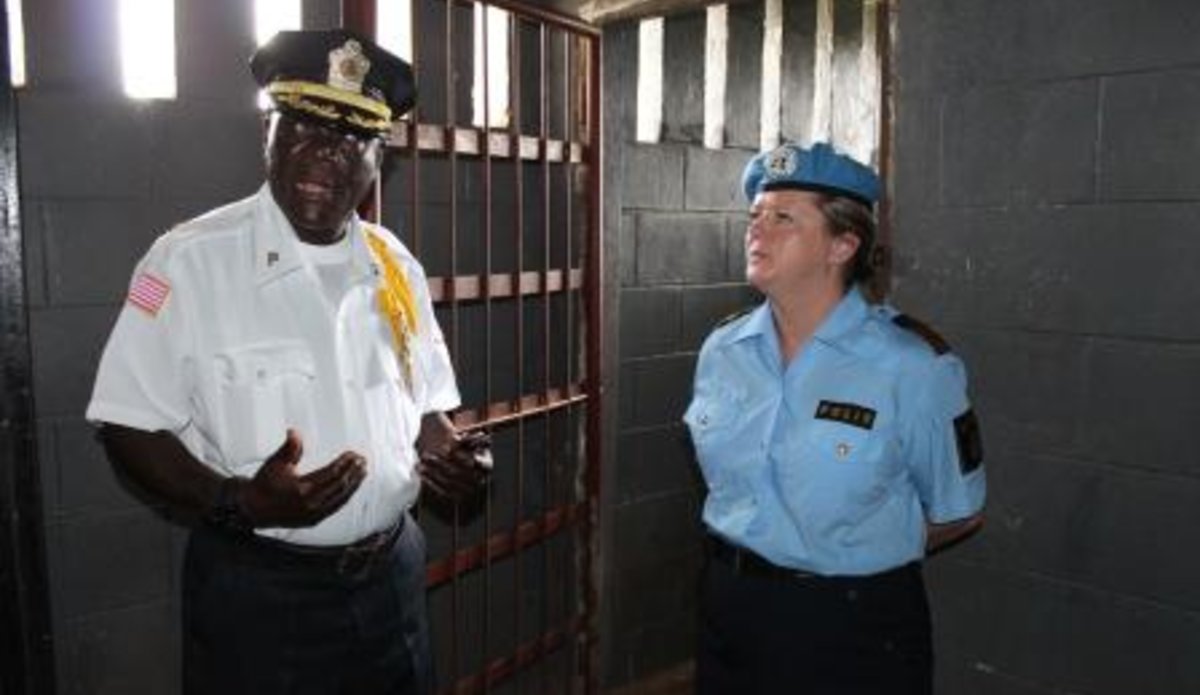Liberia National Police is Progressing : Police Adviser
During her recent visit to Liberia, UN Department of Peacekeeping Operations Police Adviser Ann Marie Orler was quick to note a marked improvement in the professionalism of the Liberia National Police (LNP) since her last visit in 2008.
Orler also noted a renewed commitment by the Liberian Bureau of Immigration and Naturalization (BIN) to reform and to rebuild their service. Yet, despite the considerable progress and commitment, much remains to be done to raise the standards of Liberia’s law enforcement agencies.
Although UNMIL is transitioning, Orler pointed out that the number of UNPOL advisers supporting the development of LNP and BIN will not be reduced. The handing over of security functions will be gradual, and commensurate with national capacities on the ground. Orler is responsible for UN police officers assigned in 19 UN missions around the world.
Police Adviser Orler was pleased to note that the LNP had and will continue to have successes in recruiting more female officers into the service. Currently over 18 per cent of the LNP are female. This figure, said the Police Adviser, is actually higher than the female representation in UN Police in general.
Orler joined a night patrol with the LNP during her visit. She noticed that although the working conditions have remained difficult, the officers were present at work and performing their duties. This commitment, despite the challenges, is clearly indicative of a young police service striving to earn the badge of professionalism.
While discussing the recent renewal of UNMIL’s mandate, which gives a greater role to the UN police in helping Liberia transition to a peacebuilding phase, and three additional Formed Police Units, Police Adviser Orler explained that the process of transitioning security responsibilities will be very gradual, allowing for the national security institutions in Liberia to gain their capacities and proficiencies to take on their new roles. “The LNP and others must be ready before we leave. We will leave when we are ready to leave,” Orler pointed out.
There are currently 498 UN Police officers mandated to assist in the development of the LNP and BIN through training and mentoring. The United Nations is working diligently to provide UN Police Officers with the right skills and the right approach to ensure the LNP and BIN achieve a level of professionalism essential for sustaining the peace in Liberia, Orler said.
On the issue of training, Commissioner Orler expressed her pleasure that a Norwegian funded infrastructure project has enabled the doubling of the National Police Training Academy’s capacity, but lamented that budgetary constraints may likely preclude maximizing seating capacities for training in the coming year. Reminding that police training is a process -- a lifetime of work -- Orler praised the NPTA for their commitment to in-service and specialized training, as well as basic training. “Training is a never-ending story,” she said.
The Police Adviser recognized LNP’s efforts to encourage females to join the service, including their extensive use of outreach programmes. However, she noted that fundamental to this is the importance of education. “It’s important that girls in Liberia go to school and finish school,” she stressed.
Speaking on the role of communities, and the relationship between police and communities, the Police Adviser reminded that Liberia has embraced the principles of democratic policing as they rebuild the LNP. “The UNPOL support to LNP is not about creating a police force – it is about developing capacities for delivery of police service – with a very strong focus on service because that’s what we – the police- are about. The police should be there to work with the community to make sure everyone feels safe. I have seen over the last couple of days very good evidence that this is what is happening.”
The Police Adviser described what she believed to be clear proof that the community trust in the LNP is improving. “Following the recent prison break in Zwedru, the fast recapture of the escapees was due principally to the support provided by the communities to the LNP. This shows that there is no doubt, improvements in the relationship and trust between communities and the LNP.” She also witnessed, during the night patrol, community members bringing a suspect into the police station and handing him over to the LNP. In past years, “mob violence” was the norm, not seeking out and handing over suspects to the LNP. “These actions clearly demonstrate improving confidence,” she said.
 UN
UN United Nations Peacekeeping
United Nations Peacekeeping





